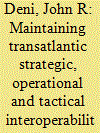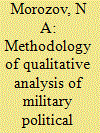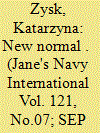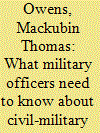| Srl | Item |
| 1 |
ID:
132081


|
|
|
|
|
| Publication |
2014.
|
| Summary/Abstract |
The NATO summit in Wales will be one of the most important since the Cold War ended - the first such summit after what is, undeniably, the end of the post-Cold War era. The goals of transitioning Afghanistan operations, preparing NATO for future challenges, and cementing the transatlantic bond have all been lent urgency by the crisis in Ukraine and the collapse of positive relations with Russia. James Bergeron explores where NATO has been on its twenty-five-year journey through the post-Cold War era and surveys the strategic challenges that the Alliance now confronts.
|
|
|
|
|
|
|
|
|
|
|
|
|
|
|
|
| 2 |
ID:
131440


|
|
|
|
|
| Publication |
2014.
|
| Summary/Abstract |
With the end of major combat operations in Afghanistan, how will the North Atlantic alliance maintain the unprecedented levels of interoperability developed over the last decade? One of the most effective means of building and maintaining interoperability-the forward-based presence of US military forces in Europe- has shrunk significantly over the last 25 years and is likely to shrink further in the coming years, meaning it will become increasingly difficult for American and European military forces to operate side by side. Nevertheless, the United States continues to look to its allies in NATO as the primary partners in maintaining and promoting common interests around the globe. Additionally, Washington seems more committed than ever to wielding force in a coalition context. In order to help remedy this seeming incongruity, Washington announced in early 2012 a plan to deploy rotationally several hundred troops from the United States to Germany for periodic exercises with European partners and allies. However, it remains unclear whether a rotational model will be sufficient to generate the level of interoperability necessary for US forces and those of its most capable European allies to work seamlessly across the range of military operations. The loss of tactical and operational interoperability threatens transatlantic strategic interoperability, and therefore risks decoupling European and American security policy. To mitigate these challenges, the article discusses several policy steps the United States should consider.
|
|
|
|
|
|
|
|
|
|
|
|
|
|
|
|
| 3 |
ID:
135263


|
|
|
|
|
| Summary/Abstract |
The paper covers the general methodology points of qualitative analysis of military political systems underlying aggregate assessments of possibilities for resolving conflicts and making recommendations for the concepts of weapons (Forces) employment in strategic Operations. It also examines the main tasks of the methodology, and the areas and limits of its application.
|
|
|
|
|
|
|
|
|
|
|
|
|
|
|
|
| 4 |
ID:
150274


|
|
|
| 5 |
ID:
133410


|
|
|
|
|
| Publication |
2012.
|
| Summary/Abstract |
It is a great honor and pleasure to return to the US Air Force Academy today. It is also a great honor to be associated with the name of Ira Eaker, a true American hero and one of the fathers of American air power. I'm sure by this time you have seen Twelve O'clock High, and I assure that if you haven't, you WILL see it in the future. You may know that Major General Patrick Pritchard, the character played by the actor Millard Mitchell, is based on Ira Eaker. When we use the movie at the Naval War College, we focus on Pritchard as an example of strategic leadership-linking the tactical and the operational levels of war to national policy. This is what Ira Eaker did: he was responsible for proving the feasibility of daylight precision bombing as an operational concept linked to national policy. Someday many of you will be expected to provide this same strategic bridge between operational art on the one hand and national policy on the other.
|
|
|
|
|
|
|
|
|
|
|
|
|
|
|
|